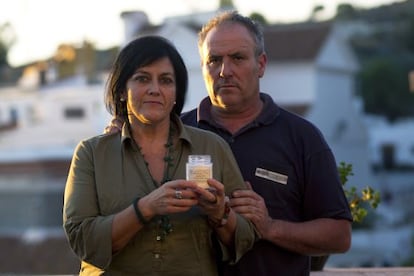Couple spent three months on bail over botched police heroin charge
Contents of jar sent from Uruguay were homeopathic, analysis showed

Gabriela González, 45, still trembles when she sees a uniform. When a police officer came to her garage looking for the source of an alarm, she hid in the bathroom. The sight of the officer brought back to mind the morning that she went to pick up a package her brother had sent from Uruguay. Gabriela and her husband Fernando, a mechanic, left at dawn to travel to the post office in Motril, five kilometers away. He had to be back at 9am to return his customers’ repaired vehicles. Fernando waited outside while Gabriela went to collect the package. It was July 23, 2010.
“ID please,” said the attendant, who looked at the card, then at Gabriela, and then disappeared into an office. On her return she motioned to two plain clothes policemen who had been standing behind Gabriela, who was handcuffed. “You are under arrest for drug trafficking,” she was told. Outside, Fernando was also being detained. The police had been following the couple for over a week and believed that the package in Motril, Granada province, was the final piece of evidence.
Gabriela and Fernando were escorted to their house, where a jar of the same substance contained in the package sat in a bathroom cabinet. Gabriela’s explanation — that the white powder was a homeopathic treatment for idiopathic myelitis, which makes walking difficult — fell on deaf ears. A “narcotest” was produced. “If it turns red, it’s cocaine; blue means heroin,” an officer told them. The small sample of powder gradually took on a bluish hue. “Heroin,” the officers said.
“How can it be heroin if my wife takes a spoonful every morning with water?” asked an incredulous Fernando. “That’s impossible,” replied an officer. “Exactly,” said Fernando. “Then she goes to the gym for an hour,” he added, his voice rising. “Take a sample of her blood and see if there’s anything in there.”
How can it be heroin if my wife takes a spoonful every morning?"
The sample was never taken and the couple was told by a prosecutor that “these drugs are worth 15,000 euros.”
“Well, the owners of the pharmacy must be idiots because I paid 50 euros for it,” said Gabriela. The cornerstone of the prosecution’s case was that the substance had been imported from Uruguay when it is readily available in Spain. Thus the police deduced it was heroin.
Gabriela and Fernando were charged and bailed. Their passports were confiscated, meaning they could not go on a planned trip to Uruguay. “They took away our freedom. For me, that was prison,” Gabriela told EL PAÍS. Three years later she is still receiving psychological treatment.
The press ran the story about “220 grams of heroin” being intercepted in Motril. Fernando’s family in Catalonia believed the reports and stopped talking to the couple, who were eventually on bail for a total of three months while the sample awaited analysis at the police labs in Málaga. The two jars in Gabriela’s possession were labeled GLUCALCH (containing calcium carbonate, megnesium gluconate, ascorbic acid and calcium caseinate).
When the sample finally reached Málaga, it took less than a week to confirm that there was no trace of narcotic in the powder. “When I ran out of my treatment I asked my brother to send me some more, which he did,” says Gabriela.
Gabriela met the police chief who had led the operation, Miguel Algárate, during a courtroom visit to retrieve her jars of treatment. She looked him in the eye: “Has it never occurred to you to apologize?” “That’s what you get for getting medicine sent from Uruguay,” he replied.
Gabriela and Fernando still have police records, which they want expunged. “It’s incredible we are still on file. It’s marked me for life. It was a case of police arrogance,” says Gabriela.
Tu suscripción se está usando en otro dispositivo
¿Quieres añadir otro usuario a tu suscripción?
Si continúas leyendo en este dispositivo, no se podrá leer en el otro.
FlechaTu suscripción se está usando en otro dispositivo y solo puedes acceder a EL PAÍS desde un dispositivo a la vez.
Si quieres compartir tu cuenta, cambia tu suscripción a la modalidad Premium, así podrás añadir otro usuario. Cada uno accederá con su propia cuenta de email, lo que os permitirá personalizar vuestra experiencia en EL PAÍS.
¿Tienes una suscripción de empresa? Accede aquí para contratar más cuentas.
En el caso de no saber quién está usando tu cuenta, te recomendamos cambiar tu contraseña aquí.
Si decides continuar compartiendo tu cuenta, este mensaje se mostrará en tu dispositivo y en el de la otra persona que está usando tu cuenta de forma indefinida, afectando a tu experiencia de lectura. Puedes consultar aquí los términos y condiciones de la suscripción digital.








































